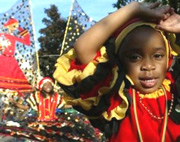 |
|
A young performer parades
in a Jamaican costume at the Notting Hill Carnival in west London,
Monday Aug. 29,
2005. | |
Thousands danced in baking sunshine at London's
Notting Hill Carnival on Monday at one of Europe's biggest street parties
despite security fears after the London bombings.
The 41st Notting Hill festival in west London's streets, a huge street
party celebrating West Indian culture, was entitled "Unity and Diversity"
this year to celebrate London's multiculturalism.
The Caribbean-flavoured party comes less than two months after the July
7 bomb attacks that killed 56 people, including four apparent suicide
bombers, in blasts on the subway and a bus. A July 21 repeat attack
failed.
"July 7 has changed London in many respects, but
the one aspect that will never change is the strength of this city, and
its diversity
," said
Chris Mullard, the head of the organizing committee.
"And nothing embodies this better than the Notting Hill Carnival."
Notting Hill was filled with revellers Monday for the final festival
day with thousands dancing in the streets to the beat of 40 sound systems
dotted around.
The carnival takes place in the once-poor, now
chic streets of the
district captured in the 1999 film Notting Hill starring Julia Roberts and
Hugh Grant.
Although police said there was no specific threat to the carnival,
about 4,500 officers were on duty, including 500 officers on public
transport, and 80 surveillance cameras were installed.
Ian Blair, London's Metropolitan Police commissioner, said the event
was going "very well".
Carla Goodchild, 23, from Stevenage, north of London, was making her
first trip to the carnival.
She said: "I've been having such a great day. I've
been doing loads of dancing, eating wonderful food and soaking up
the atmosphere.
"Seeing all the floats and all the people in their costume is just
incredible.
Debi Gardner, a board director of the London Notting Hill Carnival,
said 200,000 people attended the festival on Sunday and organisers were
expecting at least triple that during Monday's public holiday.
"If we get a million people that will be amazing," she said.
The festival was originally launched in 1959 by post-World War II
immigrants from what were then Britain's Caribbean colonies, as a
community act of defiance after ugly race riots the year before.
It was held in various parts of London for a number of years before settling
permanently in Notting Hill in
1964.
(Agencies) |
�����ر�ը�¼������Ǵ����ĿֻŻ�û��ȫ��ɢ������һ����Ȼ����ǧ����ð�������������Ͻ�ͷ���μ�һ��һ�ȵ���ŵ��ɽ�ڣ�����ȫŷ������ģ�Ľ�ͷʢ��֮һ��
�����41��ŵ��ɽ�����������Ľֵ����У���һ��ͷ�Ļ�����ʢ��ּ�ڼ���ͺ�����ӡ���Ļ���Ϊ���������Ļ��Ķ����ԣ�����ŵ��ɽ�ڵ�����Ϊ��һ���������������
7��7�գ�Ҳ���Dz���������ǰ���ط��������صĵ���������ը����ը�¼���56���ڱ�ը��ɥ�������а�������������ը�������˺�7��21�գ��ֲ���������ͼ�����ٴ����챬ը�¼�������û�гɹ��������º�Ľ��죬����������ձȺ����������ʢ���������ھ��С�
�����߱�ը�¼�ʹ�ط����˺ܴ�ı仯��������һ��ȴ������û�иı�����Ǿ����������еĵֿ����Ͷ����ԡ���ŵ��ɽ����ί����ϯ����˹��������˵��
����ŵ��ɽ���������������Ļ������Ե���õ����֡���
����һ���������ŵ��ɽ�ڽ������һ��ʱ����ǧ����Ŀ��߾ۼ���ŵ��ɽ���������Ž���ɢ���ŵ�40������ϵͳ�Ľ����ظ����衣
����ڵľٰ���������Ҳ����������ڵ������Ǿ��µĽֵ���1999���������ǡ����ĺ��ݡ����������ݵĵ�Ӱ��ŵ��ɽ����������������ġ�
�����ؾ�����ʾŵ��ɽ��û���ܵ��κ���в����������Ȼ�����˴�Լ4500�������μ�ִ�ڣ����а���500���ڹ�����ͨϵͳִ�ڵľ��죬���������80̨��������
���ؾ���־ֳ�������������˵ŵ��ɽ�ڽ��е÷dz�˳����
�����ر�������˹�ٷҰ��εļ����š��²���½���23�꣬��������һ�����زμӿڡ�
��˵�������������̫�����ˣ���һֱ�ڲ�ͣ�����裬�����˺ܶ�óԵĶ��������������������Ľ������ա���
����ô�������ô���˴��Ÿ�ʽ������������裬��һ�����Ҿ����������š���
��ŵ��ɽ��ίԱ�����ε±ȡ��ӵ���˵������20���˲μ��˻����֯����Ԥ����һ��ʼ�Ĺ������ս����������������ϵ���Ⱥ��
�������ʱ����100���ˣ��Ǿ�̫�����ˣ�����˵��
ŵ��ɽ�����翪ʼ��1959�꣬��ʱ����ս������Ӣ�����ձȺ�ֳ��ص���������֯������һ�����գ�������Ƕ�ǰһ�귢���Ķ�������ɧ���¼�����ս�����ӡ�
ֱ��1964�꣬�ڲ����ս��ٰ��ȷ����ŵ��ɽ���ڴ�֮ǰ���ص����ط��������ٰ�������Ľ��ա�
���й��ձ���վ Ѧ�����룩 |
